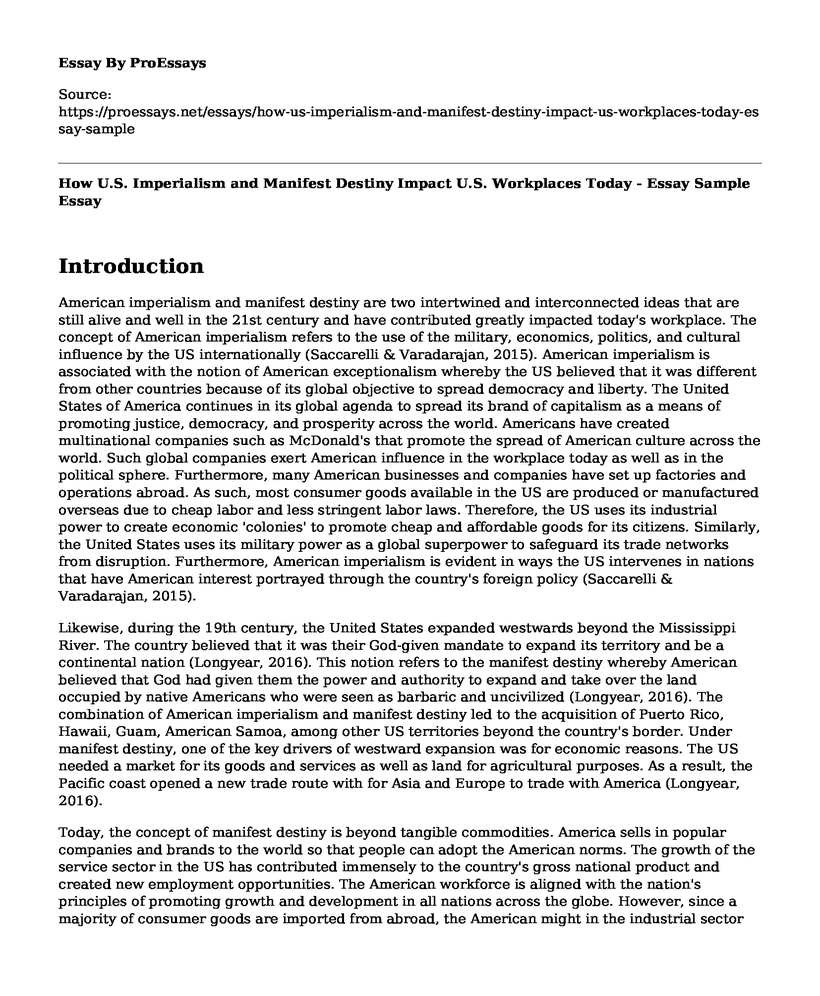Introduction
American imperialism and manifest destiny are two intertwined and interconnected ideas that are still alive and well in the 21st century and have contributed greatly impacted today's workplace. The concept of American imperialism refers to the use of the military, economics, politics, and cultural influence by the US internationally (Saccarelli & Varadarajan, 2015). American imperialism is associated with the notion of American exceptionalism whereby the US believed that it was different from other countries because of its global objective to spread democracy and liberty. The United States of America continues in its global agenda to spread its brand of capitalism as a means of promoting justice, democracy, and prosperity across the world. Americans have created multinational companies such as McDonald's that promote the spread of American culture across the world. Such global companies exert American influence in the workplace today as well as in the political sphere. Furthermore, many American businesses and companies have set up factories and operations abroad. As such, most consumer goods available in the US are produced or manufactured overseas due to cheap labor and less stringent labor laws. Therefore, the US uses its industrial power to create economic 'colonies' to promote cheap and affordable goods for its citizens. Similarly, the United States uses its military power as a global superpower to safeguard its trade networks from disruption. Furthermore, American imperialism is evident in ways the US intervenes in nations that have American interest portrayed through the country's foreign policy (Saccarelli & Varadarajan, 2015).
Likewise, during the 19th century, the United States expanded westwards beyond the Mississippi River. The country believed that it was their God-given mandate to expand its territory and be a continental nation (Longyear, 2016). This notion refers to the manifest destiny whereby American believed that God had given them the power and authority to expand and take over the land occupied by native Americans who were seen as barbaric and uncivilized (Longyear, 2016). The combination of American imperialism and manifest destiny led to the acquisition of Puerto Rico, Hawaii, Guam, American Samoa, among other US territories beyond the country's border. Under manifest destiny, one of the key drivers of westward expansion was for economic reasons. The US needed a market for its goods and services as well as land for agricultural purposes. As a result, the Pacific coast opened a new trade route with for Asia and Europe to trade with America (Longyear, 2016).
Today, the concept of manifest destiny is beyond tangible commodities. America sells in popular companies and brands to the world so that people can adopt the American norms. The growth of the service sector in the US has contributed immensely to the country's gross national product and created new employment opportunities. The American workforce is aligned with the nation's principles of promoting growth and development in all nations across the globe. However, since a majority of consumer goods are imported from abroad, the American might in the industrial sector has led to the growth of sweatshops in developing countries such as China, Vietnam, Philippines, and India. On the other hand, American imperialism and manifest destiny have significantly affected immigration in the sense that low-paying jobs are available for unskilled and semi-skilled immigrants (Frymer, 2017). As much as the country endows workplace diversity, there is inequality in terms of wages and jobs available for immigrants.
Conclusion
In conclusion, American imperialism and manifest destiny are evident in the workplace today. The US has moved from the 19th-century notion of acquisition of physical territory to the expansion in terms of American capitalism, democracy, politics, and businesses. Imperialism and manifest destiny have promoted the growth of multinational American companies that promote diversity in the workplace as well as enacting American influence across the world.
References
Frymer, P. (2017). The Limits of Manifest Destiny. Building an American Empire.
Longyear, B. B. (2016). Manifest destiny. New York: Open Road Media.
Saccarelli, E., & Varadarajan, L. (2015). Imperialism Past and Present. New York, NY: Oxford University Press.
Cite this page
How U.S. Imperialism and Manifest Destiny Impact U.S. Workplaces Today - Essay Sample. (2022, Nov 21). Retrieved from https://proessays.net/essays/how-us-imperialism-and-manifest-destiny-impact-us-workplaces-today-essay-sample
If you are the original author of this essay and no longer wish to have it published on the ProEssays website, please click below to request its removal:
- Essay Sample on 21st Century Policymaking: Challenges and Impacts of Advocacy
- Essay Sample on Mercy's Steps for Accepting New Policy: Research, Testing, Feedback
- Research Paper on SB 50: Futuristic Policy for Sustainable Urban Development
- Democratic Party: Weakness or Strength? - Essay Sample
- Essay Example on The Fall of the USSR: Long-Lasting Global Effects
- Report Sample on the U.S. Healthcare System: A Complex Network of Providers and Regulators
- Paper Sample on Yemen: World's Worst Humanitarian Crisis of the Decade







